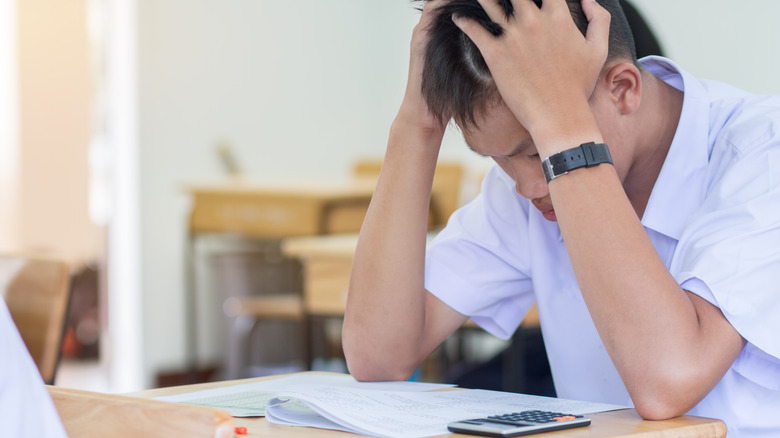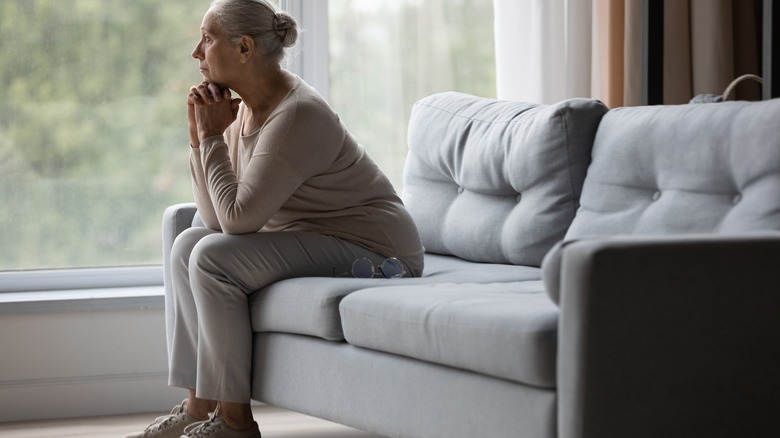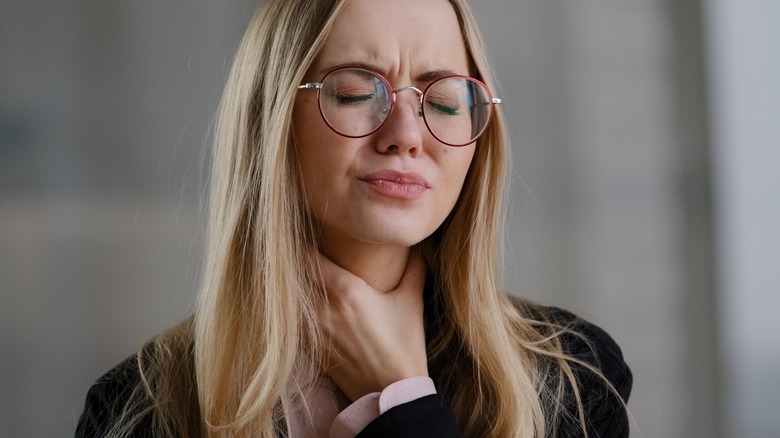Despite how common anxiety is, it’s easy to get some things wrong when thinking about the disorder. According to the Anxiety and Depression Association of America, anxiety affects about one in five American adults, making it the most common mental illness in the country. And less than half of those experiencing an anxiety disorder get treatment, making it difficult to recover and heal. Some myths about anxiety disorders might seem harmless but could be really dangerous, so it’s important to know the facts.
In an exclusive interview, Health Digest spoke with Carolyn Rubenstein, Ph.D., a licensed psychologist in Boca Raton, Florida, about some of the top myths regarding anxiety. Dr. Rubenstein helps people who are anxious experience more ease in life, helping them to find their worth in who they are rather than how much they do. Sound like you, too? Maybe you have some long-held beliefs about anxiety that are holding you back and causing unnecessary struggle. And maybe it’s time to debunk them. Here are the top myths about anxiety that you should seriously reconsider.
Anxiety is just a phase

It might be tempting to think that feeling anxious is just a phase that we’ll get through soon enough. And while sometimes that’s true, anxiety can also last quite a bit longer than you hope. “We all have times in life that are more stressful than others, such as a looming exam, job interview, financial hardships, et cetera,” Dr. Rubenstein told Health Digest. During these particularly stressful times, your anxiety might spike and then fade away once the exam is over or you make it through the job interview. But for some people, anxiety can continue even when the stressful period is past.
“If anxiety lingers longer than specific triggers, you may have an anxiety disorder that could be helped by cognitive behavioral therapy and/or medication,” said Dr. Rubenstein. “Even for those who do have a disorder, there are times when symptoms are worse than others.” Working with a trained professional can help you determine if you meet criteria for an anxiety disorder.
Lifestyle changes can cure anxiety disorders

You might already have some skills that you know will help you cope with your anxiety. “Eating sensibly, reducing sugar, limiting caffeine and alcohol, and getting regular exercise can all help with anxiety,” Dr. Rubenstein shared. These might help manage anxious thoughts and feelings, but not everyone is the same. Everyone experiences anxiety differently and at different levels of severity.
“Unfortunately, these good habits are not enough for many to cure anxiety,” said Dr. Rubenstein. “Some people’s brains are ‘wired’ for anxiety, and their bodies produce more adrenaline and remain in flight or fight mode even if no real danger is present.” While fight or flight mode can be useful when there’s actual risk present, staying in it when there’s nothing actually threatening about a situation can cause you to experience unnecessary anxiety (via Medical News Today). If this is the case, going for a run or eating more nutritious foods won’t cure your anxiety disorder. Talk to a healthcare provider to discuss options for treatment that might work for you.
Anxiety and panic attacks are dangerous

MAYA LAB/Shutterstock
If you’ve ever experienced an anxiety or panic attack, you know it can sometimes feel like you’re dying. But luckily, that can’t actually happen. “Many often think they will die from a panic attack, which is a fallacy,” Dr. Rubenstein shared. “Panic attacks can be excruciating mentally and physically, but they are not fatal.”
If you’ve never had an attack before and you experience your first one, it’s common to feel like something is terribly wrong and you need to go to a hospital immediately. “If someone has one for the first time, they often mistake the symptoms for that of a heart attack because the symptoms can be similar, such as sweating, tight chest, shaking, dizziness, shortness of breath, et cetera,” said Dr. Rubenstein. But it’s most likely not a heart problem. “If you know you are a healthy person without a heart condition, these are all common signs of panic that will not harm you physically or cause you to ‘go crazy.'” Knowing what to expect ahead of time can be critical in how you handle a panic attack in the moment.
People with anxiety should avoid stressful situations
Ground Picture/Shutterstock
“What you resist persists,” explained Dr. Rubenstein. “Life is stressful. Anxiety sufferers might avoid situations that trigger them, such as travel, public speaking, social situations, or enclosed spaces.”
While avoiding trigger-inducing situations may seem like a reasonable response, it’s not going to help you in the long run. As Dr. Rubenstein told Health Digest, “Although it might seem logical to run from what you fear, exposing oneself gradually and in ‘baby steps’ to the ‘scary situation’ builds confidence and breaks down the fear.” This might look like going for a quick drive again after experiencing a car accident or gathering the courage to go to a social gathering for a short time despite having social anxiety.
Dr. Rubenstein explained that continuously keeping ourselves protected from what scares us can actually do more harm than good. “The more people avoid what they fear, the more time they spend ruminating about having to do it one day, and the fear becomes insurmountable.”
You can find out more about Dr. Carolyn Rubenstein by visiting her website: https://carolynrubenstein.com.

